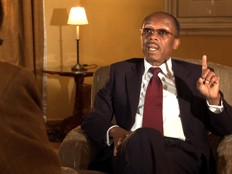 An exclusive interview with former Haitian President Jean-Bertrand Aristide – November 2010
An exclusive interview with former Haitian President Jean-Bertrand Aristide – November 2010Two week ago, I conducted an exclusive two-hour interview with the former President in the hills of Johannesburg. I spoke with him about his life in forced exile, Haiti’s current political situation, and his possible return to Haiti. This is an excerpt of the interview.
Mr. President Aristide, thank you for having me today. My first question is about the earthquake that took place in Haiti in January of 2010. Can you tell me how and when you learned about the tragedy?
It was morning here. I was at Witwatersrand University here in Johannesburg to work in the lab of the Faculty of Medicine for Linguistics and Neuroanatomy. I realized that it was a disaster in Haiti. It was not easy to believe what I was watching. We lost about 300,000 people, and in terms of the buildings, they said that about 39% of the buildings in Port-au-Prince were destroyed, including fifty hospitals and about 1,350 schools.
Up until today they have cleared only about 2% of these 25 million cubic meters of rubble and debris. So this was a real disaster. We could not imagine that Haiti, already facing so many problems, would now face such a disaster. Unfortunately this is the reality. I was ready to go back to help my people, just as I am ready to leave right now if they allow me to be there to help. Close to 1.8 million victims are living in the street homeless. So this is a tragedy.
Your former colleague, the current President René Préval, was highly criticized after the earthquake for being absent. Overall, he was judged as not having shown enough leadership. Do you think that’s a fair criticism?
I believe that January 12, 2010 was a very bad time for the government and for the Haitian people. To have leadership, yes it was necessary, overall, to be present in a time of disaster like this one. But to criticize when you aren’t doing any better is cynical. Most of those who were criticizing him sent soldiers to protect their own geopolitical interests, not to protect the people. They seized the airport for their own interests, instead of protecting the victims – so for me there should be some balance.
Can you give us your thoughts on the recent cholera epidemic?
As for this recent incident of cholera, whether or not it was imported – as the evidence strongly suggests – it’s critical. First, those who organized the coup d’état/kidnapping of 2004, paving the way for the invaders now accused as having caused the recent outbreak of cholera, must also share the blame. Second, the root causes, and what facilitated the deadly spread of the disease are structural, embedded in Haiti’s historical impoverishment, marginalization and economic exploitation. The country’s once thriving rice industry – destroyed by the subsidized US rice industry in the 1980s – was in the Artibonite, the epicenter of the cholera outbreak. The near destruction of our rice industry coupled with the systematic and cruel elimination of the Haitian pigs rendered the region and the country poorer. Third, in 2003 our government had already paid the fees on an approved loan from the InterAmerican Development Bank to implement a water sanitization project in the Artibonite. As you can remember, that loan and four others were blocked as part of a calculated strategy by the so-called friends of Haiti to weaken our government and justify the coup d’état. Full Story
No comments:
Post a Comment